G.090.01 - Lyon (January, 1918)
 |
| 329. Environs de Lyon - L'ILE-BARBE - Vue génerale - E.R. |
In the vicinity of Lyon - L'ile Barbe (Barbe Island)
I närheten av Lyon - L'ile Barbe
To: Mr Gustaf Ekman, Backa, Brålanda, Suède (Sweden)
From: Gerda (Lyon, 14.1.1918)
From: Gerda (Lyon, 14.1.1918)
Ouvert par l'Autorite Militaire
Opened by the Military Authorities
Opened by the Military Authorities
31 av. de Noailles, Lyon
My dear brother, Did you get my card I sent you to Xmas? I have not heard from you for a long time. I am writing this in english because I think you >> will get it quicker and if you can write me a card in english and tell me how Ester is ...
... getting on. I have had no letters from home for Xmas. I hope you are all well. I am quite so. I am so sorry for Ester that she is not well. I hope she will be better after this illness. Best love, and write me soon. / Gerda
Ester was one of Gerda's and Gustaf's older sisters - born 1876, two years older than Gustaf, five years older than Gerda. Like Gerda, she never got married; but unlike her two younger siblings, she did not emigrate with them to America in 1902, but stayed in Sweden. After working as housekeeper at a big estate, and then at a garden center, she ran her own flower shop (in Mullsjö near Jönköping); and later a confectionary. Whatever her health problem was in 1918 (at age 42), she lived to be 82.
31 av. de Noailles, Lyon (14.1.1918)
Min käre bror, fick du mitt kort som jag skickade dig till jul? Jag har inte hört något från dig på länge. Jag skriver detta på engelska därför att jag tror du får det snabbare [då]. Och om du kunde skriva ett kort till mig på engelska och tala om hur Ester mår? --- Jag har inte fått några brev hemifrån till jul. Jag hoppas att ni alla mår bra. Med mig är det rätt bra. Jag är ledsen att Ester inte mår bra. Jag hoppas hon ska bli bättre efter den här sjukdomen. Kära hälsningar, och skriv snart. / Gerda
Ester var en av Gerdas och Gustafs äldre systrar, född 1876, två år äldre än Gustaf, fem år äldre än Gerda. Liksom Gerda gifte hon sig aldrig, men hon emigrerade inte med de yngre syskonen till Amerika, utan stannade i Sverige. Efter att ha arbetat som hushållerska på en egendom nära Falköping, och sedan på en trädgårdsskola, drev hon sedan under många år en blomsterhandel i Mullsjö, och därefter en konfektyrbutik. Vilka hälsoproblem hon led av 1918 vet jag inte - men hon levde till att bli 82 år gammal.
G.090.02 - Nice / Menton (April, 1918)
 |
| 6. MENTON. - Vue prise de la Frontière Italienne. - L.L. |
MENTON - View from the Italian border.
MENTON - Vy tagen från italienska gränsen.
To: Mr Gustaf Ekman, Storegården, Fristad, Suède
From: Gerda (Nice, 10.4.1918)
Ouvert par l'Autorite Militaire
Opened by the Military Authorities
Opened by the Military Authorities
Nice d. 10 april 18
Käre bror! Det är länge sedan jag hörde från dig. Har hört genom Sally du är hemma nu. Hoppas ni alla äro krya hemma. Jag är nu ute på en liten resa igen. Reser till Lyon igen om söndag. Kära hälsningar till er alla från syster Gerda. - Skrif när du kan är du snäll.
Gerdas första kort 1918, skrivet i mitten av januari, sände hon till Gustafs adress i Brålanda, där han bott de senaste fem åren. När hon skriver igen i april, från Nice på franska rivieran, har hon fått veta - inte av Gustaf själv, men av deras yngre halvsyster Sally (min farmor), att han flyttat "hem" till Storegården i Fristad, Västergötland. (Mer om detta längre ner.)
Nice. 10 April 1918
Dear Brother, it's been a long time since I heard from you. I heard from Sally that you are home now. I hope you are all well there. I am now away on a little trip again. Will be going back to Lyon on Sunday. Love to you all from sister Gerda. - Write when you can, please.
Gerda's first card in 1918, written in mid January, was sent to Brålanda in Dalsland, where Gustaf had been living for about five years (since around Christmas 1913). When she writes again in April, from Nice on the Riviera, she has learned, not from Gustaf himself, but from their younger half-sister Sally (my grandmother), that he has moved back "home" to the family farm Storegården at Fristad, in the province of Västergötland. (More about that below.)
G.090.03 - Brides-les-Bains (August, 1918)
 |
| 1673. BRIDES-les-BAINS et les Glaciers de Vanoise |
To: Mr Gustaf Ekman, Storegården, Fristad, Suède (Sweden)
From: Gerda (Brides-les-Bains 13.8.1918)
From: Gerda (Brides-les-Bains 13.8.1918)
Ouvert par l'Autorite Militaire
Opened by the Military Authorities
Opened by the Military Authorities
Brides-les-Bains 13 juli '18 [August] *
Dear brother, How are you. I am in the mountains, it is very pretty here. I have been here since the 29th of July * and are going to stay until the 30th of september. I will soon write you a letter. My best wishes and love to you all. / Gerda
* There is some mix-up of dates here. The postmark seems to say 13.8 so I think she arrived 29 July, and wrote the card 13 August.
Brides-les-Bains 13 juli '18 [augusti] *
Käre bror, hur mår du? Jag är i alperna, det är väldigt vackert här. Jag har varit här sedan 29 juli * och ska stanna till 30 september. Jag ska snart skriva ett brev till dig. Kära hälsningar till er alla. / Gerda
* Något datum måste vara fel här. Poststämpeln ser ut att vara 13.8. Jag tror hon anlände 29 juli, och skrev kortet 13 augusti.
MEANWHILE IN SWEDEN.... (May 1918)
G.091.01 - Uppsala Castle
 |
| Upsala. Slottet |
(The image on the card is not related to the message.)
To: Herr Gust. Ekman, Åkerhult, Bredaslätt, Hökerum
From: Sally (Gustaf's younger half-sister, my grandmother)
(Fristad 24.5.1918)
From: Sally (Gustaf's younger half-sister, my grandmother)
(Fristad 24.5.1918)
Storegd Fristad d. 24/5 '18.
Hälsningar från Fristad. Undrar huru Ni mår. Ella är här nu, hon kom i onsdags kväll. Edit var här igår eftermiddag emelllan 4 och 8-tåget. Vi voro i skogen och drucko kaffe* och hade så roligt, då skulle Gustav varit med. Undrar om Ni köpt någon ko. Gustav har fått brev idag. Kära hälsningar från oss alla. Hälsn. Sally
Storegården Fristad, 24.5.1918
Greetings from Fristad. I wonder how you are. Ella is here now, she came Wednesday night. Edit was here yesterday afteroon between the 4 pm and 8 pm trains. We were in the woods and had coffee* and had such a good time. You should have been with us. I wonder if you have bought any cow. You have had a letter today. Love from us all, Sally
Greetings from Fristad. I wonder how you are. Ella is here now, she came Wednesday night. Edit was here yesterday afteroon between the 4 pm and 8 pm trains. We were in the woods and had coffee* and had such a good time. You should have been with us. I wonder if you have bought any cow. You have had a letter today. Love from us all, Sally
---
From some Christmas cards from 1917, I conclude that Gustaf moved back to Storegården, Fristad, around Christmas 1917 (after five years at Brålanda in Dalsland, some further 130 km north of Fristad, and before that, one year in Värmland, a bit further north still). He'll be 40 years old in the summer of 1918.
Storegården (name meaning "Big Farm") was the family farm, in 1918 run by the eldest brother Carl (48), living there together with his stepmother Selma (57) and her three children - a daughter from her first marriage, Hildur (26), my grandmother Sally (18) and Nils (16). (The father, Samuel, died back in 1907.)
As for the reason why Gustaf moved back, I can only speculate. Maybe Carl had expressed need of his help? Maybe Gustaf simply was no longer happy with his situation in Brålanda, and missing his family? And/or maybe (as has been vaguely hinted at now and then in his wartime correspondence with Gerda) he did actually eventually win a bit of money in a lottery - not enough to go into farming on his own, but perhaps enough to enter into some kind of partnership with his brother?
Alas, I can't recall ever hearing any family story told about this. All I have is those mysterious allusions on various wartime postcards, with Gerda repeatedly wishing her brother "luck" connected to the same recurring date, the 15th. And then, in 1917, suddenly a couple of hints that Gustaf seemed to be thinking of moving to a farm of his own. But then the fact that towards the end of 1917, he moved back to the family farm in Fristad instead - and remained living there for many years to come.
But, getting back to May 1918: If Gustaf has moved back - why is Sally writing to him at a different address??
The villages Fristad and Hökerum are situated only about 20 km apart. And Sallys question at the end suggests that Gustaf has gone to Hökerum with a purpose: To buy a cow. (Which seems to support the idea of him now taking active part in running the farm.)
Sally (my grandmother, now 18 years old) seems to have taken over as "main correspondent" at the farm. Back in those days, they used postcards pretty much as we send digital text messages today. So she sends a card just to tell Gustaf that they have had visitors in his absence, and that a letter is waiting for him at home. (I'm so glad she also added the question about the cow, though, as that explains why he's away.)
The visitors, Ella and Edit, were their nieces, daughters of their oldest sister Emma. Emma, born in 1866, was 44 (!) years older than Sally (and only five years younger than her "stepmother", Sally's mother Selma). I don't have the dates of birth of Ella and Edit, but thinking about it, I realise that they must have been older than Sally, and to her probably would have felt more like older cousins than "nieces".
- - -
*/ "We were in the woods and had coffee"
Still in my own childhood (1950s), my grandma Sally loved a "coffee picnic". An illustration that my mother made in 1957, in my first photo album, came to mind for me. I recognise Sally's basket...
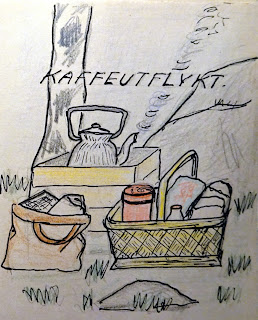 |
| Kaffeutflykt - Coffee Picnic |
And in one of Sally's photo albums, I found this photo (below), which she has dated to 1921, and with a note that the occasion was "a break in the work of potato lifting". As the photo is rather blurry, I'm not sure who is who. It could be Gustaf in the middle, thoguh, holding a cup. And possibly Sally on the right.
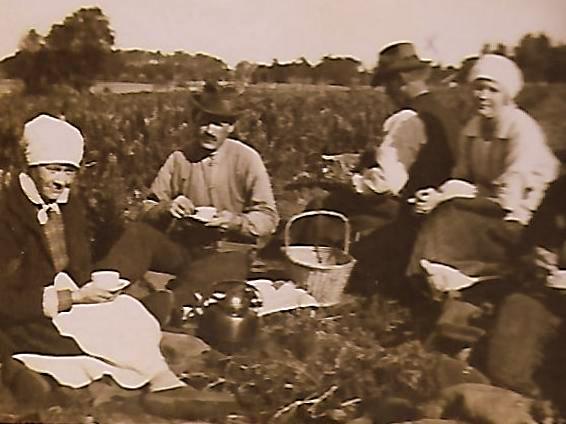 |
| "Paus i potatisupptagning 1921" |
In the same album, there are also two blurry photos to do with milking cows on the farm. Neither of them has a date attached but my guess is that they are from around the same time. I think it's probably Sally in both photos.
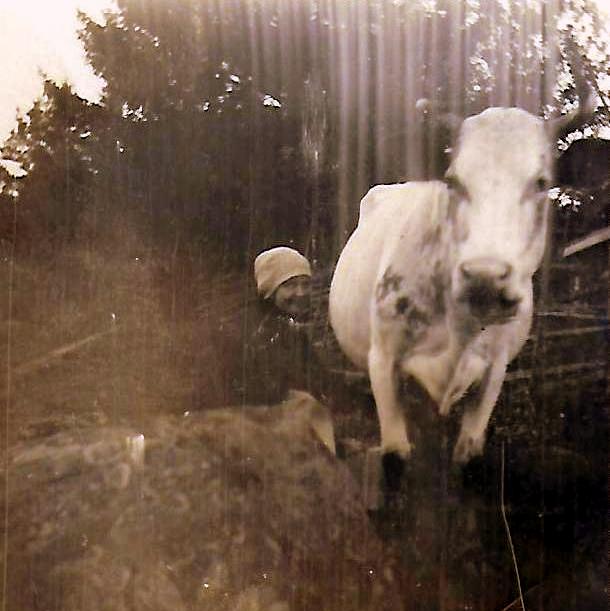 |
| "Kon mjölkas" - Milking the cow |
- - -
World War One ended at 11 am on 11 November, 1918.
(This became known as Armistice Day.)
(This became known as Armistice Day.)
Gerda remained in France until the end of September 1919;
then she returned to Sweden.
then she returned to Sweden.
(That was not the end of Gerda's travels, though!)
- - -
I have no more postcards written by Gerda in 1918, nor any from 1919. But according to notes I received back in 2013 from a relative (BW, grandson of Emma), a work certificate, dated 28.9.1919 in Lyon, states that Gerda has been working as Lady's Maid, and is an excellent packer and hairdresser and a neat needlewoman, and her French is good. I also know that after her employment in Lyon ended, she did go back to Sweden - but that this was not the end of her travels. Although I have no postcards written by Gerda from the next decade (until 1928), I do have some other clues. So I'll try to continue the story, putting together what I have.
SVENSKA
Av några julkort från 1917 drar jag slutsatsen att Gustaf flyttade tillbaka till Storegården i Fristad omkring jul 1917 (efter fem år i Brålanda, Dalsland, och dessförinnan ett år i Värmland). Sommaren 1918 ska han fylla 40 år.
Storegården var familjejordbruket, vid denna tid skött av äldste brodern Carl (48), som bodde där tillsammans med sin styvmor Selma (57) och hennes tre barn: en dotter från hennes första äktenskap, Hildur (26), min farmor Sally (18) och Nils (16). (Fadern, Samuel, dog redan 1907.)
När det gäller orsaken till att Gustaf flyttade tillbaka, kan jag bara spekulera. Kanske hade Carl uttryckt behov av hjälp? Kanske trivdes Gustaf bara inte längre med sin situation i Brålanda? Eller var det faktiskt så (som antytts då och då under kringsårens korrespondens med Gerda), att han till sist faktiskt vunnit lite pengar på lotteri - dock inte tillräckligt för att flytta till en egen gård trots allt, men kanske tillräckligt för att ingå någon form av partnerskap med brodern?
Tyvärr kan jag inte erinra mig att jag någon gång hört en sådan historia refereras till inom familjen. Allt jag har är de mystiska antydningarna på flera vykort från kringsåren, där Gerda önskar honom tur och lycka till, i anknything till ett upprepat datum: den 15. Och sedan, 1917, antydningar om att han verkar ha planer på att flytta från Brålanda till en egen gård (oklart var). Men sedan istället, kring jul 1917, flyttar tillbaka till Fristad - och blir kvar där.
Men, för att återvända till Sallys vykort från 1918: Om nu Gustaf flyttat tillbaka till Storegården - varför skriver då Sally ì maj 1918 till honom på en annan adress? Svaret finns i texten. Hökerum ligger bara ett par mil från Fristad, och tydligen är Gustafs ärende där att köpa en ko. (Vilket verkar tyda på att han nu är aktivt involverad i skötseln av Storegården.)
Sally, 18 år nu, verkar ha tagit över som "förste korrespondent" på gården. Vykort vid den här tiden användes fortfarande ungefär som vi skriver textmeddelanden idag, så hon skriver för att meddela Gustaf att de haft besök under hans frånvaro, och att ett brev också väntar på honom hemma. (Jag är glad att hon även la till frågan om koköpet, eftersom det förklarar varför han är borta!)
Besökarna, Ella och Edit, var döttrar till äldsta systern Emma. Emma, född 1866, var hela 44 år äldre än Sally (och bara fem år yngre än sin "styvmor" Selma). Jag har inte Ellas och Edits födelsedatum, men inser när jag tänker på saken att de måste ha varit äldre än Sally, och måste ha känts mer som äldre kusiner till henne än "systerdöttrar".
"Vi voro i skogen och drucko kaffe."
Fortfarande i min barndom älskade Sally att göra "kaffeutflykter". Teckningen med kaffekorgen är ritad av min mamma, i mitt första fotoalbum. Fotot nedanför är från ett av Sallys album, och försett med anteckningen "Paus i potatisupptagning 1921". Fotot är lite suddigt, så inte helt lätt att identifiera personerna, men jag tror det kan vara Gustaf i mitten, med kaffekopp, och Sally till höger.
I samma album finns också två foton som hör ihop med kor : "Inför kvällsmjölkningen" och "Kon mjölkas". Antagligen är det Sally på båda bilderna.
- - -
Första Världskriget upphörde kl 11.00 den 11/11 1918.
Gerda blev kvar i Lyon i Frankrike till slutet av september 1919;
sedan återvände hon till Sverige.
Hon kom dock att göra många fler utlandsresor under sitt liv.
Gerda blev kvar i Lyon i Frankrike till slutet av september 1919;
sedan återvände hon till Sverige.
Hon kom dock att göra många fler utlandsresor under sitt liv.
---
Jag har inga fler vykort skrivna av Gerda från 1918, och inte heller 1919 (och ett antal år därefter). Men enligt uppgifter jag fick 2013 av Bengt W, sonson till Emma, finns ett intyg daterat 28.9.1919 i Lyon, som bekräftar att Gerda varit anställd som Lady's Maid (kammarjungfru), och att hon skicklig både på att packa, och som hårfrisörska och sömmerska, och talar bra franska. Jag vet också att hon efter att ha avslutat anställningen i Lyon reste tillbaka till Sverige - men att detta långt ifrån innebar slutet på hennes resande. Även om jag inte har några vykort skrivna av Gerda under de närmast följande åren, så har jag en del andra uppgifter och foton. Och sedan några vykort till, från 1928 och in på 30-talet. Så jag hoppas kunna fortsätta historien genom att lägga pussel med det jag vet.





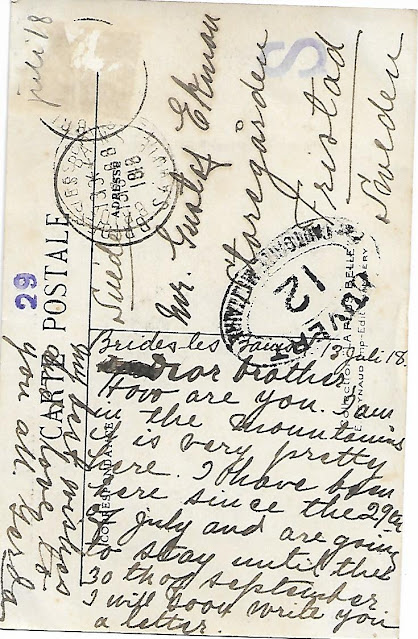
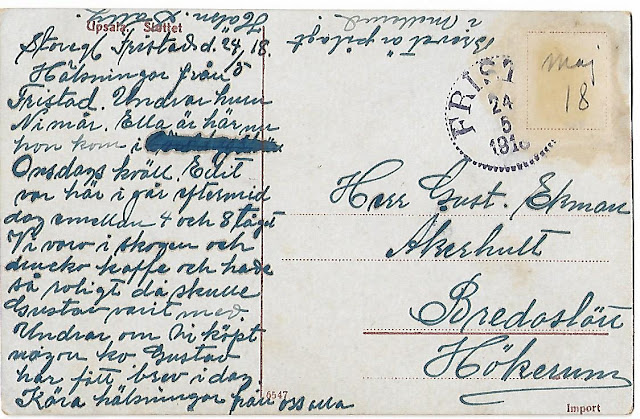


I continue to enjoy your translations of the postcards as well as summaries of what the various relations of your grandmother were doing. Love the idea of coffee picnics!
ReplyDeleteThanks Barbara. It turned into a rather lengthy post, but I felt I wanted to "wrap up" the WW1 years.
DeleteWhat a wonderful collection of family photographs and postcards- an inspiration for a fascinating blog on Gerda's journeys and relations with her family members.
DeleteThanks Sue. I have to say that with time I have managed to get more info out of them than I thought I would when I first inherited them!
DeleteHow great that they exchanged so many postcards to give you hints to what was happening in their lives.
ReplyDeleteKristin, yes, although most of the postcard messages are short, together they still provide quite a few "clues"!
DeleteOh good! I was hoping there would still be more to the story of Gerda - I've been enjoying reading her postcards and your interpretations of what they probably mean in terms of hers and her family's lives. I can't remember if I asked this before, but what does -koping mean taked onto the end of name places? My GGrandmother is from a place in Sweden with the ending 'koping'. The idea of a coffee picnic sounds delightful. What could be better than a nice cup of coffee with maybe some cookies or cake or ? :)
ReplyDeleteLaN, "köping" is an old Swedish word for a (small) market town. Nowadays there is no longer any legal distinction made between cities, market towns or municipalities. (stad/köping/kommun) "-köping" is still part of the name of some towns, but rarely used as a stand-alone word anymore.
DeleteGlad you've been enjoying reading about Gerda - it's nice to have some people giving feedback while I'm trying to sort out the family history! I've been intrigued by my grandmother's family all my life, I think, because she used to talk about them. But as a child I never grasped the vast age difference between her and her older half-siblings. I think I was more under the impression that they all grew up together.
Thanks for the reply. My GGrandmother, Johanna Magdalena Hedman, was from Norrkoping, Sweden, but came to the U.S. with her family - to Salt Lake City, Utah - when she was 11 years old. I don't know much about her, but I have a few pictures of her and a lace tablecloth she made. :)
DeleteLaN, I don't think I've ever been to Norrköping myself. But one of Gerda's and Gustaf's brothers, Oscar, seems to have moved there with his family at some point. I mostly have only short greetings like Christmas or birthday cards from him in Gustaf's postcard collection though.
DeleteThis has been such a wonderful series on your family, Monica, that I almost "hear" Gerda's voice in reading her messages. Your stories on her postcards has revealed so much more than just a family history and is fascinating for how you place Gerda in the context of her era's history and geography too. I especially like the multi-cultural element of learning about how her life in Sweden, France, Switzerland, and America too.
ReplyDeleteOn my internet browser I have a small plug-in that let's me highlight a place name and then instantly find it in Google maps. I often "fly" to the places in Gerda's postcards and wander around in the modern street view or satellite images. She must have felt very proud to have seen so many beautiful parts of the world.
Thanks very much, Mike. I should explore those possibilities with Google maps a bit more myself!
Delete